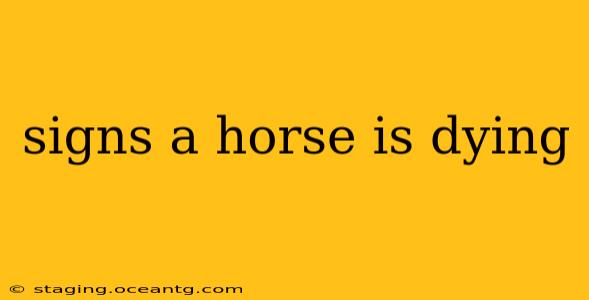Losing a horse is incredibly difficult for any equine enthusiast. Knowing the signs that your horse is approaching the end of their life can help you provide comfort and make difficult decisions with grace and compassion. This guide explores the subtle and obvious signs a horse may be dying, allowing you to be better prepared and provide the best possible care during their final moments. It's crucial to remember that each horse is an individual, and the progression of their decline may vary. Consulting your veterinarian is essential throughout this process.
What are the early signs a horse is dying?
Early signs can be subtle, often mistaken for minor illnesses. Observing changes in your horse's behavior and physical condition is paramount. These early warning signs may include:
- Lethargy and Weakness: A noticeable decrease in energy levels, reluctance to move, and difficulty standing or rising are key indicators. They may spend more time lying down than usual.
- Loss of Appetite: A significant reduction or complete loss of interest in food and water is a serious concern. This can be a sign of underlying organ failure.
- Weight Loss: Unexpected and unexplained weight loss, even with adequate feed, points towards a serious underlying health issue.
- Changes in Behavior: Changes in temperament, becoming unusually quiet or withdrawn, or exhibiting signs of confusion can be early warning signs.
- Colic: While not always a direct indicator of death's approach, severe or recurring colic episodes can be a sign of a failing system.
How can I tell if my horse is in their final hours?
As the end nears, the signs become more pronounced and unmistakable. These late-stage symptoms often indicate imminent death:
- Extreme Weakness and Inability to Stand: The horse may be unable to rise even with assistance. Their muscles may be severely atrophied.
- Rapid, Weak Pulse: Checking the pulse in the jaw or tail artery will reveal a weak, rapid, or thready pulse.
- Difficulty Breathing: Labored breathing, characterized by shallow breaths and open-mouth breathing, is a serious sign. You might also notice a rapid respiratory rate.
- Cold Extremities: The horse's legs and ears may feel cold to the touch, indicating poor circulation.
- Pale Gums: Pale or white gums indicate poor blood flow and oxygenation. This is a critical sign.
- Lack of Response: A significant reduction in responsiveness to stimuli, including touch and sound.
- Loss of Bowel and Bladder Control: Incontinence is a late-stage symptom often associated with organ failure.
- Rolling Eyes: The horse may exhibit rolling eyes, often a sign of neurological compromise.
- Death Rattle: A rattling sound in the chest during breathing, caused by fluid buildup in the airways.
What are some less obvious signs a horse might be dying?
Some signs are more subtle and require a keen eye and understanding of your horse's normal behavior. These include:
- Changes in Urination and Defecation: Changes in frequency, consistency, or color can indicate underlying problems.
- Persistent Coughing or Wheezing: This could indicate respiratory distress or infection.
- Recurrent Laminitis: Severe and recurring bouts of laminitis can indicate serious health complications.
- Depression and Isolation: Increased social withdrawal and lack of interest in interactions with other horses.
What should I do if I think my horse is dying?
Immediate veterinary attention is crucial. Your vet can offer an accurate prognosis, provide pain relief, and guide you through this difficult time. They may recommend euthanasia to prevent suffering if the horse’s condition is irreversible. Providing comfort and a peaceful environment is of utmost importance during their final hours.
What is the process of a horse dying?
The dying process varies depending on the underlying cause. However, many horses experience a gradual decline marked by increasing weakness, organ failure, and eventual cessation of vital functions. The duration can range from hours to days.
How do I know if my horse is suffering?
Recognizing signs of suffering is vital. Look for signs like restlessness, excessive sweating, labored breathing, and obvious signs of pain. If you suspect your horse is in pain, contact your vet immediately.
This information serves as a guide only. It’s impossible to definitively diagnose a dying horse without a veterinary examination. Always consult your veterinarian for professional advice and guidance. Remember, providing comfort and care during your horse’s final moments is of paramount importance.
